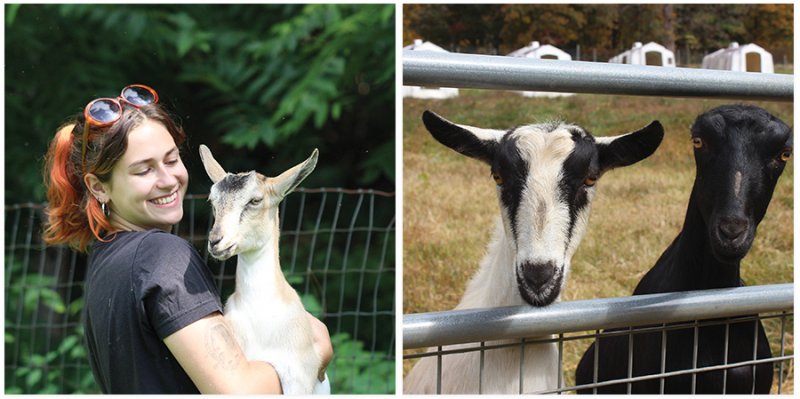Herds & Curds
Herds & Curds: A behind-the-scenes look at making goat cheese
(Left to right) June Hillman; According to Hillman, each goat has their own unique personality. They are known to be affectionate, silly, and even jealous.
Goat cheese has a long, global history; as early as 5000 BC, humans were consuming goat’s milk in some form. Now, Western North Carolina, a region populated by salt-of-the-earth farming communities, is chock-full of creameries, so much so that turophiles can follow the WNC Cheese Trail on a tasting journey of some of the best handmade cheeses made in the South.
One of the first stops on this trail is Round Mountain Creamery, just a little over thirty minutes away from downtown Asheville. June Hillman has been working at the creamery for just over five years, and has worked at just about every position there. “I started as a ‘pusher,’ which just meant I would feed the goats while someone else milked them. Over the years, I started learning everything,” from milking and caring for the goats to pasteurizing cheese and assisting in live births, Hillman recalls.
Cheese making is an everyday labor of love. Every day, Hillman explains, there is something to do in the cheese room, from pasteurizing to packaging. After amassing the right amount of goat’s milk in a refrigerated container, the makers begin the pasteurization process. “Pasteurization kills off any bad bacteria in the milk,” she clarifies. The makers then mix in bacterial cultures, calcium chloride (for stabilizing the cheese and helping it curdle), and rennet, which coagulates the mixture. After the mixture sits for a while, creamers transfer the mixture to a hanging cheesecloth, where gravity separates the solid curd from the liquid whey. On the last day, makers remove the curds and begin adding flavors to create the final packaged product.

What makes a quality goat cheese? The answer isn’t something that’s always found on a label or packaging. “The goat’s diet and health are the best indicators of how it’s going to taste in the end,” explains Hillman. Typically, goat cheese has a uniquely tart and earthy flavor. Goats that have the opportunity to eat lots of grass will produce more milk with a stronger flavor, and a lower yield of milk can indicate a lack of nutrients for the animals.
Owner Linda Seligman purchased the farmland in the ’90s, but it wasn’t until 2002 that she created the creamery—with a mere five goats to supply the dairy. “Treating the animals with kindness is her big mission. She started hoarding all the goats that she could so she knew they were all taken care of,” Hillman explains, smiling. “We try to prioritize keeping [the goats] happy and healthy. We do that by not milking them as long as we possibly can.” Typically, goats are milked for around 305 days, but at Round Mountain, they are cut off at nine months.
Goats typically live around fifteen years, and Round Mountain’s goats have a regimented system to ensure that senior nannies get to enjoy their retirement. The retirees are given the opportunity to hang out with their herd on the farm, transfer to a homestead, or work as a “goat lawn mower,” by grazing on large patches of grass as an alternative to traditional mowing, a fad that has become popular in local communities.
ROUND MOUNTAIN CREAMERY
2203 Old Fort Rd., Black Mountain
(828) 669-0718
roundmountaincreamery.com
